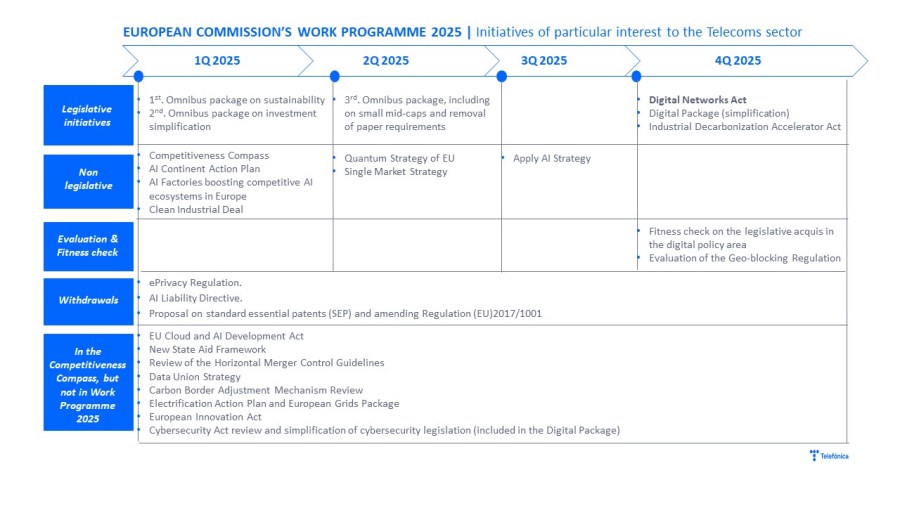If 2024 was the year the Letta and Draghi reports signalled the decline of the EU’s competitiveness, 2025 has the opportunity to become the year of action; the time to implement concrete measures to reverse this trend and position Europe as the best place to do business and live in.
In the political guidelines for 2024-2029, President von der Leyen reaffirmed her commitment to lead a renewed Commission with a clear focus on prioritising investment, fostering innovation, simplifying EU rules and deepening the single market.
The mission letters, the Competitiveness Compass for the EU, and the European Commission’s Work Programme 2025 are closely linked in advancing the Commission’s strategic agenda. On one hand, the mission letters set clear priorities for each Commissioner, aligning their work with the broader goal of boosting EU competitiveness. On the other hand, the Competitiveness Compass sets the strategy for innovation and investment, guiding sectoral policies. As a result, the Work Programme 2025 outlines key policy and legislative initiatives for the year, ensuring the effective implementation of the mission letters’ actions across the Commission.
The EU Competitiveness Compass
The Competitiveness Compass guiding the Commission’s five-year mandate, recognizes that the next years’ North Star must be the renewal of Europe’s competitive strength. Europe has all the assets necessary to be competitive, but a change of gear is urgent. In response, it introduces a comprehensive strategy combining industrial policies, investment, and reforms to boost economic dynamism, with innovation at its core.
This framework focuses on closing the innovation gap, aligning decarbonization with competitiveness, and reducing excessive dependencies and increasing security. Key enablers include simplifying regulation, lowering Single Market barriers, enhancing financing through a Savings and Investment Union and a refocused EU budget, promoting skills and social fairness, and better coordinating policies at national and EU level.
The Compass also outlines initiatives for the telecoms sector. It recognises that closing the innovation gap will require investment to provide state-of-the-art digital infrastructure. This includes expanding 5G, enhancing gigabit connectivity, and simplifying regulations to attract investment and accelerate roll out. It also calls for a fresh approach to competition policy, enabling companies to scale and drive innovation. Additionally, it underscores the importance of digital skills and advancing technologies like artificial intelligence, cloud computing, and quantum to secure Europe’s leadership in the global digital economy.
Commission Work Programme 2025: What is in it for Telcoms?
“Citizens and businesses have called for a simpler EU that delivers prosperity. This work programme is our answer. We’ve heard you, we’re simplifying, and we will deliver. This roadmap charts our course to a more competitive, resilient, and growth-oriented Europe.”
Ursula von der Leyen, President of the European Commission.
On 11 February, the European Commission published its Work Programme for 2025, titled “Moving forward together: A bolder, simpler, faster Union”. This year’s theme revolves around simplifying rules and effective implementation. It lists new legislative initiatives, as well as revision and withdrawal of existing ones (see infographic below).
As such, the Commission included three Omnibus proposals which, adopted in subsequent steps, will tackle priority sectors mentioned in the Draghi report, streamlining and simplification of sustainability reporting, sustainability due diligence and taxonomy, and creating a new category of small mid-caps with adapted requirements.
Aside from the Omnibus proposals, Telefónica welcomes the inclusion of the Digital Networks Act (DNA) and the Digital Package in this year’s Work Programme. The long-awaited DNA aims to improve market incentives to build the digital networks of the future, reduce burden and compliance costs, and improve digital connectivity for end-users by deepening the Single Market and a more coordinated EU spectrum policy.
Moreover, the Digital Package presents a new opportunity to accelerate the “path to a digital regulatory environment” and will propose to remove inefficient requirements for paper formats in product legislation and build synergies and consistency for data protection and cybersecurity rules.
Regarding withdrawals of existing legislative files, the Commission presented three of particular interest:
- ePrivacy Regulation
- AI Liability Directive
- Proposal on standard essential patents (SEP) and amending Regulation (EU)2017/1001
These files have been withdrawn due to the lack of a foreseeable agreement with the European Parliament and Council or because the content of the legislation is outdated in view of more recent legislation.

Telefónica welcomes the Commission’s Work Programme 2025
As mentioned, Telefónica particularly welcomes the inclusion of the Digital Networks Act (DNA) in the Commission’s Work Programme 2025. The DNA is a key opportunity to address Europe’s digital infrastructure challenges and drive forward a forward-looking framework that is aligned with market realities and ensures sustainability of investments and rebalancing of the internet ecosystem.
To increase effectiveness, key priorities should include revising sector-specific regulations that discourage investment and risk-taking, embedding competitiveness as a central policy objective, and adopting a pro-investment spectrum strategy by ensuring certainty around license renewals and spectrum allocation under reasonable conditions. Additionally, it is essential to restore balance to the digital value chain, through horizontal frameworks that eliminate sectoral approaches and asymmetries and fostering a fair relation between actors in the internet value chain.
In addition, simplifying the regulatory landscape will foster innovation. Therefore, we welcome the proposal to eliminate redundant or outdated rules, such as the sector-specific e-Privacy regulation, which overlaps with the GDPR already addressing privacy concerns in all sectors.
Furthermore, to review the approach to competition policy with a focus on competitiveness will be crucial for telecom operators to achieve scale in their relevant markets and enhance their long-term viability.










